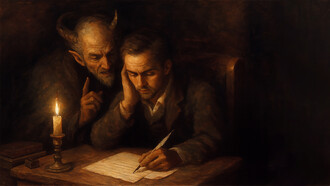Of all the love stories that have ended badly, the story of the mandarin's bird would be the saddest. During the Ming dynasty, there lived a mandarin named Zhangqi. He lived in a yellow house with blue walls, along which ran a blue river. He taught art history at the imperial court. On his wedding day, the emperor had given him a small, rare yellow bird. From dawn to dusk, the bird filled this childless home with its sweet melodious songs. But one day, without any reason, it remained inert on the swing. No longer singing, its head hidden in its wings so that Zhangqi could not see its sad look. The bird no longer wanted to eat.
WeiWei, please don't die, he whispered. If the life in a cage suffocates you, fly away, land on a branch of a tree and build your nest. But please don't forget me.
The bird gently raised its head, stared intently at her master, and then flew away. Zhangqi’s eyes were full of sorrow tears.
A few days later, while the mandarin was having lunch, WeiWei reappeared at the window, before coming to rest on his shoulder.
Are you hungry? Asked the mandarin with a happy face and eyes full of joy tears.
He handed to the bird a small piece of his bun, which the animal immediately devoured. From then on, they never left each other's side. It seemed that they had even invented their own language to communicate. The more their union grew, the more the mandarin's wife became jealous. Taking advantage of her husband's absence, she captured WeiWei and prepared a meal. When the mandarin came back from work, he enjoyed the diner without noticing that he had eaten his yellow his friend.
Sitting at the window, Zhangqi watched for the slightest flutter of wings. He was worried about his bird: I hope no harm has come to her, he prayed fervently. From time to time, a croak from a bush near the marsh would rouse him from his musings, but there was no sign of WeiWei. The mandarin abandoned his work, spending his days and nights waiting in vain for the bird to return. And finally, one day he let himself die of grief.
The moon watching over human souls had such pity on the mandarin and his bird, that it gave them a second chance. After many centuries, lifetime after lifetime, the bird returned to the human world in the form of a young woman. Her whole life was dedicated to the one quest, finding Zhangqi. Then one lucky day, in a crowd of strangers, WeiWei recognised the young man's voice. She threw herself at him and embraced him.
Zhangqi! Finally, I have found you! I've been looking for you since the dawn of time, she sobbed. The stranger's gentleness had overwhelmed the young man. Nevertheless, he gently pushed her away and said:
Miss, I’m sorry. I’m not your Zhangqi.
Then he walked away, turning his head one last time before disappearing into the crowd. An invisible arrow pierced WeiWei's heart and tore it to shreds. Head down, like when she was a bird hiding her head in her wings, she stalked to the shade of a weeping willow tree and looked at the blue river disappearing into the sea. Thinking of Zhangqi, she shed all the tears in her body before turning into a yellow bird and flying to the moon to forget her beloved lover forever.
This story is inspired by the painting "The Mandarin's Wife" by Lê Phổ, a Vietnamese painter (1907-2001). It was the first time in the world that a Vietnamese painting was featured on the cover of a catalogue, on the 19th December 1996, at Drouot. This painting was estimated at 8,000 euros and was finally sold for 25,000 euros. Today, it is worth 2 million euros (source: Jean-Francois Hubert).















